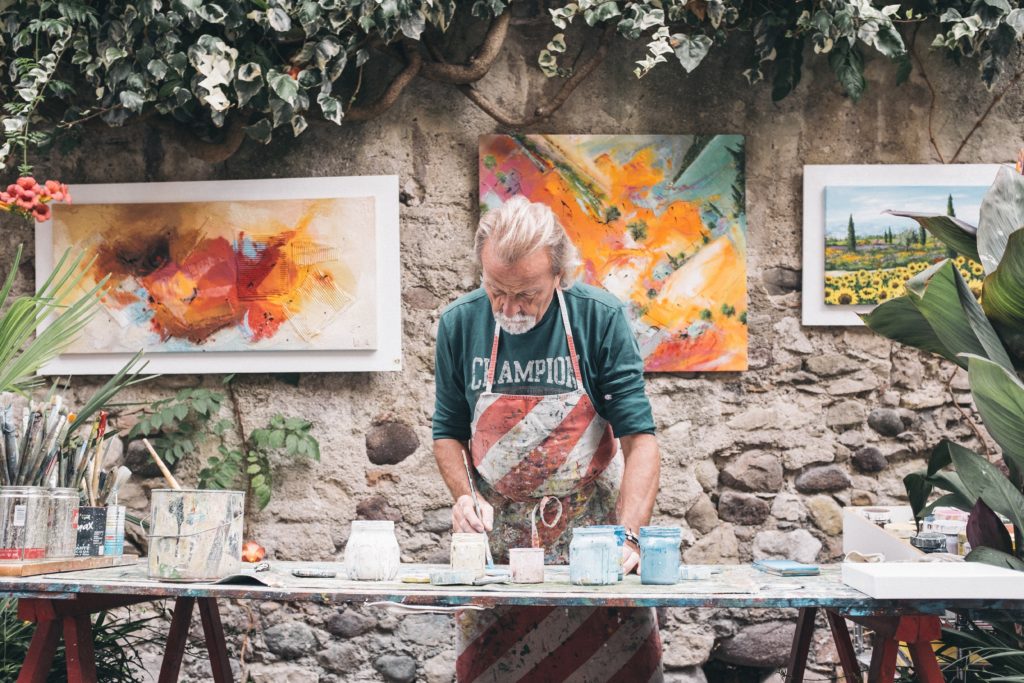He had done his art for over 35 years. Every morning he woke up and went to his studio. These days he was older so he limped more than walked there.
He looked at his subject—some peaches on a table or apples or grapes. These simple beauties still dazzled him. Then he breathed, picked up his palette. And he painted.
Just a small-town artist doing what he loved.
Over the years he occasionally would give one of his paintings to a neighbor or friend, always to the open-mouthed delight of the recipient. Or maybe when family was over, he would bring out a piece or two to share.
Eventually an art dealer in Paris heard about the artist’s work and convinced him to let the public have a look. The dealer put together an exhibition, and art collectors were astounded. For the first time the world stood before the work of Paul Cezanne, whom many today consider the father of modern art.
Cezanne himself was taken aback. Making his way into the gallery that revelatory day, Cezanne staggered a bit. He leaned on his son’s shoulder and said, “Look, they have framed them.”
Our First Love
We get into this because we love it. Our creative work feeds our souls, and every now and then we feel like we’re helping to feed someone else’s soul too.
We write for hours and hours and don’t want to stop. We get wrapped up in it, and when we’re away from it, we pine to get back.

We, like Cezanne, don’t think about anything else. It’s just us and our art, and the rest falls away.
And then something happens. Or often it does anyway.
Maybe the reason Cezanne could maintain his purity of perspective was because he lived before the Internet. Regardless, something changes for us. We start worrying about traffic and comment count and subscribers and platform. We’re told we have to worry about these things if we want publishers to take us seriously.
And we can begin to lose our first love. It can be crowded out amid a mass of nagging concerns. “Will anyone read this? What will they think of it? Is this my breakthrough?”
It becomes harder to get lost in our work.
A Holy Naiveté
A certain naiveté is essential to every artist, regardless of your medium, be it words or acrylics or tempos or even interviews and board meetings. (In my mind you’re an artist if you use your mind to solve problems. Writers do that. So do musicians and managers.)

The kind of naiveté I think we all need is the kind Cezanne had. We need in some way to become like children again. I see it in my own kids. When they’re out riding their bikes or swinging in a tree or building Legos or imagining a parallel universe with their stuffed animals, they’re completely immersed. It’s just them and their art. Their naiveté about other cares of the world is precious, holy even.
And my guess is that’s why you’re in this. You’ve experienced those moments when time stood still and everything vanished around you. You’ve had moments when you got lost in your art.
But maybe you’re struggling. Maybe now you’re wrought with so many other anxieties, it’s hard to see anything else. Maybe sometimes it’s hard to remember what it felt like to love this. Has it started to feel like more of a grind than anything else?
If so, I want to offer some ideas for getting back to that sense of wonder and passion and love for this gift we’ve all been given.
- Do the art thing first. Before you get on social media or text or take a phone call or look at your stats, do your writing. Let creativity be one of if not the first thing you engage in each day. At times I think creativity is the only truly human endeavor. It’s certainly more humanizing than doing email!
- Block it out. Make time for this. Decide when you’re going to write and schedule it. And remember to linger sometimes. An author I’ve worked with, Alan Hirsch, has referred to “loving on” his writing. I like that. Sometimes our words need us to linger over them a bit, particularly when the first draft is done. Don’t overdo this. More prose has been murdered than nurtured by an excess of attention. Try to find the right balance.
- Create sacred space. Your work is nothing if not sacred. Do what you can to facilitate an environment that honors the holiness of your work. For some (me sometimes) this can be as simple as an awesome cup of coffee in a café with some ambient tunes. For others it might be dim light and a candle burning. If you haven’t already downloaded my worksheet that helps you develop your process, click here.
Sometimes just a small change in your routine can make a huge difference. Respect your art. It’s important, so give it its due. Set up your life in a way that honors this endeavor. If you do, odds are good you’ll find yourself back in the flow. Just you and your art.
Question: What’s one thing you can do in the coming days to help you recapture your first love? You can leave a comment by clicking here.
Editorial Note: I first heard the story about Cezanne in The Spirituality of Imperfection by Ernest Kurtz and Katherine Ketcham (Bantam, 1993). My version above takes some imaginative liberties, but the main events of the narrative cohere to what I read in Kurtz and Ketcham.

Thank you, Chad. You always help focus me on what matters most. I appreciate you!
Most welcome!
Schedule, schedule, schedule. I needed that! Thanks, Chad.
As Michael Hyatt says, what gets scheduled gets done! You’re welcome, Curtis!
When I started reading this post, my mind immediately recalled the Unsplash photo of a French man at his outdoor art studio. I used it in a recent post of my own, finding it rich and compelling. I imagined you were making up a story about him, as that same image came into view, so I was surprised to discover you were talking about Cezanne!
Anyway, thank you for this post. It is hard not to get caught up in the maintenance and work involved in the promotion of our art, through platform-building, etc. I actually don’t have a sacred space or time to devote to my writing right now- I just squeeze it in where I can- but I do want to devote more of my time and efforts to writing with joy instead of compulsion.
Can you speak at all to the balance of maintaining a blog and still having time for creative writing pursuits? Sometimes, I feel like my blog requires so much time and attention, leaving little left to work on other writing projects.
Aimee, thanks for writing. One thing to try is giving yourself the freedom at least every now and again to do a more creative blog post. Many of my blog posts are pragmatic. Readers ask me questions, and I try my best to answer them. But everyone once in a while I go off the beaten path a bit and allow myself to be more creative. I mean, I try to be creative in every post, but some material lends itself to that more than others, you know?
So that’s one idea. Another is to carve out some regular time just to create–to ignore the other voices and do your thing. This is so important. Ideally we’d do this once a week, but even once a month is better than nothing.
Also, have you read my piece on unncessary creating? I think it might be useful to you. Here it is: http://www.accidentalcreative.com/creating/how-unnecessary-creating-changes-everything/
After reading Living Forward, I know the importance of scheduling in time–even if it means scheduling time to ‘get lost’ in my art. I actually find that exercise (without earbuds) or birdwatching with my camera gets my creative juices flowing and helps me solve writing problems. I think scheduling in those outside times helps as well.
Such a great idea, Anita. Love the idea of scheduling these kinds of activities.
Perfect timing Chad. My kids (all but my 6 month old) are gone this weekend. I’ll be writing tomorrow morning starting at 530. Inspiring post. Art first.
Awesome! How’d it go?!
I could always use more time but it went well. Nearly finished a few projects. Also got some much needed rest and felt inspired to keep moving on my books/website.
Excellent!
In the next few days I can “Block it out.” I can be diligent in scheduling time to work on my art, making it a priority, and allowing me to say “I’m busy, or can’t help right now,” when asked. Then – “Do the art thing first.” I need to be more careful about accepting every special request or project that may come my way, and consider my own ideas as worthy of the time and effort. Thank you for all of the suggestions!
You’re welcome, Holly. Greg McKeown’s book Essentialism includes a whole chapter on saying no that I found really helpful.
I usually schedule writing for early in the day, but often when I get my words done, or I finish a scene, I start thinking about other things that I have to get done. I might try scheduling my time for “other things” as well. So if “getting other things done time” starts at 10am, and I “finish” writing at 9:30am, then I have 30 minutes to get lost a little more in the love of writing without feeling any guilt or anxiety about not getting all the other stuff done. Just an idea.
Love the Cezanne story!
I love this idea! It’s amazing how our psychologies can work for or against us…